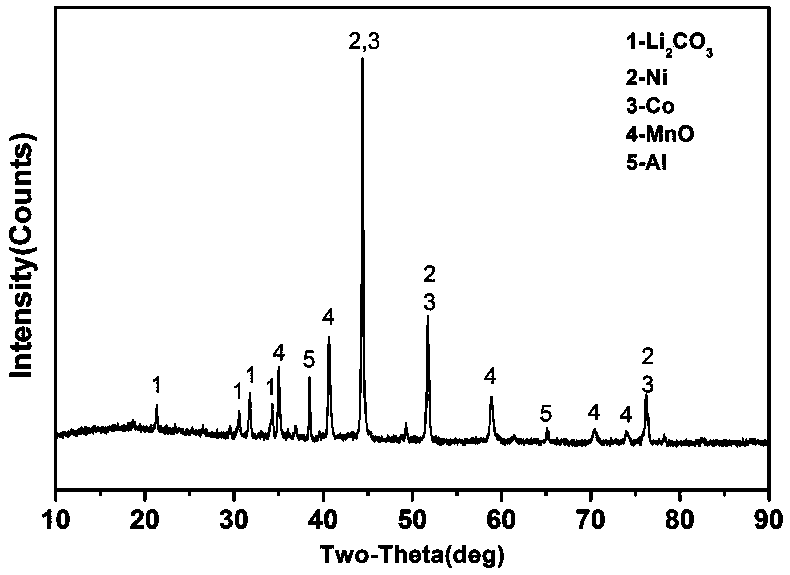A method for comprehensive recovery of valuable metals from waste lithium-ion battery materials
A technology for lithium-ion batteries and valuable metals, which is applied in the field of recycling and electronic waste recycling, can solve the problems of difficult lithium recovery, complex purification and separation procedures, etc., and achieve the effects of low reagent cost, reduced energy consumption, and high-efficiency recovery
- Summary
- Abstract
- Description
- Claims
- Application Information
AI Technical Summary
Problems solved by technology
Method used
Image
Examples
Embodiment 1
[0024] 10g of nickel-cobalt-manganese ternary lithium ion battery waste was crushed and ground, and then mixed with 6g of brown coal with a carbon content of 45%, and placed in a muffle furnace for reduction roasting. The reduction roasting temperature was controlled to 500°C and the roasting time was 5 hours. The roasted product is placed in water at a solid-liquid ratio of 1:20 for immersion while passing CO 2 , Access to CO 2 The molar amount is 0.65 times the molar amount of lithium in the solution, the immersion temperature is 5° C., the time is 0.5 hours, and the pH is controlled to 8.13. After the immersion, the lithium-containing aqueous solution is filtered, which can be used to prepare lithium carbonate products. The filter residue was added to a 1.5mol / L sulfuric acid solution at a solid-liquid ratio of 1:20, while air was blown into it, and stirred at a constant temperature of 50°C for 5 hours, and filtered to obtain a sulfate solution containing cobalt, nickel, and m...
Embodiment 2
[0026] Simply crush and finely grind the discarded lithium cobalt oxide battery soft pack. The carbon content is measured to be 1.8%. Then 10g battery waste powder is mixed with 1g anthracite with 91% carbon content and placed in a muffle furnace for reduction. For roasting, control the reduction roasting temperature to 500°C, and the roasting time for 3 hours. Weigh the product after reduction and roasting and place it in water according to the solid-liquid ratio of 1:15 for water immersion while introducing CO 2 , Access to CO 2 The molar amount is 4.6 times the molar amount of lithium in the solution, the water immersion temperature is 25° C., the time is 2 hours, and the pH is controlled to 8.56. After the water immersion, a lithium-containing aqueous solution is obtained by filtration, which can be used to prepare lithium carbonate products. The filter residue was added to a 3mol / L sulfuric acid solution at a solid-liquid ratio of 1:10, while oxygen was bubbled in, stirred ...
Embodiment 3
[0028] 10g of lithium manganate battery waste was crushed and ground, and then mixed with 5g of bituminous coal with 75% carbon content, and placed in a muffle furnace for reduction roasting. The reduction roasting temperature was controlled to 750°C and the roasting time was 1 hour. Weigh the product after reduction and roasting, and place it in water at a solid-liquid ratio of 1:10 for water immersion while introducing CO 2 , Access to CO 2 The molar amount is 3.8 times the molar amount of lithium in the solution, the immersion temperature is 30° C., the time is 3 hours, and the pH is controlled to 9.00. After the immersion, the lithium-containing aqueous solution is filtered, which can be used to prepare lithium carbonate products. The filter residue was added to a 4mol / L nitric acid solution according to a solid-liquid ratio of 1:3, and hydrogen peroxide was added at the same time, and stirred at a constant temperature of 20°C for 10 hours, and filtered to obtain a nickel-con...
PUM
 Login to View More
Login to View More Abstract
Description
Claims
Application Information
 Login to View More
Login to View More - R&D
- Intellectual Property
- Life Sciences
- Materials
- Tech Scout
- Unparalleled Data Quality
- Higher Quality Content
- 60% Fewer Hallucinations
Browse by: Latest US Patents, China's latest patents, Technical Efficacy Thesaurus, Application Domain, Technology Topic, Popular Technical Reports.
© 2025 PatSnap. All rights reserved.Legal|Privacy policy|Modern Slavery Act Transparency Statement|Sitemap|About US| Contact US: help@patsnap.com

